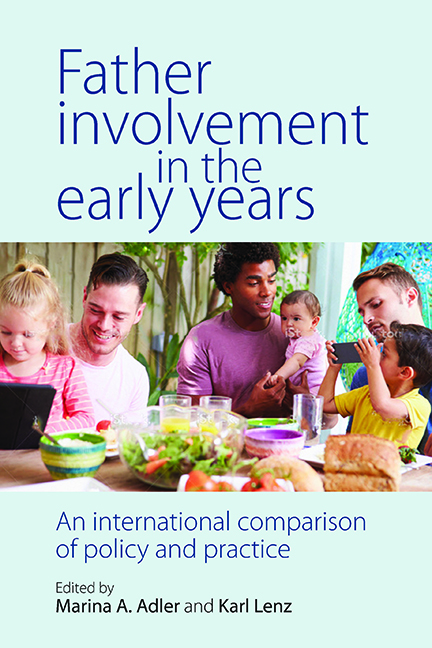Five - The United Kingdom
Published online by Cambridge University Press: 01 September 2022
Summary
The cultural and policy context of fatherhood
The family and work policy context of fatherhood in the UK occupies a midway position between continental Europe's social investment and solidarity model and the USA's private, market-oriented model. There is cultural endorsement that the government and citizens should work together to ensure the welfare of families and children, particularly those deemed ‘deserving’, through taxation and voluntary action (Daly, 2010). It is notable that public spending on family benefits is 4% of gross domestic product (GDP), above the Organisation for Economic Co-operation and Development (OECD) average of 2.6% of GDP (OECD, 2009). However, unlike its Nordic neighbours, the UK is more likely to spend in terms of child-related cash and tax transfers to parents than in public infrastructure, such as nurseries and centrebased facilities.
Historically, British contemporary family and work policies influencing fathers need to be set against two evolving societal processes and structures. First, the post-Second World War national welfare state provision of universal health and social security underpinned a male-breadwinner and female-homemaker division of family labour in a stable married family unit. Second, the inclusion (since 1973) in a pan-European governmental arrangement – first the European Economic Community (EEC) of six countries and now the European Union (EU) of 29 countries – has, despite its diversity, promoted female employment and work–family reconciliation policy measures in the UK. The politics and policies of both the UK and the EU have witnessed significant changes influencing families over the last 60 years (Lewis, 2009). However, two common features have been a move towards: (1) a mixed economy of welfare, incorporating private and public provisions, especially since the economic downturn of 2008; and (2) a dual-earner/dual-carer family model and increased parental separation and divorce, away from the strong male-breadwinner model (Lewis, 1992).
Like other countries across the world, Britain has been expanding programmes to promote the stronger engagement of men in family care activities throughout the life course. Part of the motivation has been to help modernise work–family policies and to catch up with the changing position of women. Today, fathers in Britain are expected to be accessible to and nurturing of, as well as economically supportive of, their children.
- Type
- Chapter
- Information
- Father Involvement in the Early YearsAn International Comparison of Policy and Practice, pp. 157 - 192Publisher: Bristol University PressPrint publication year: 2015

